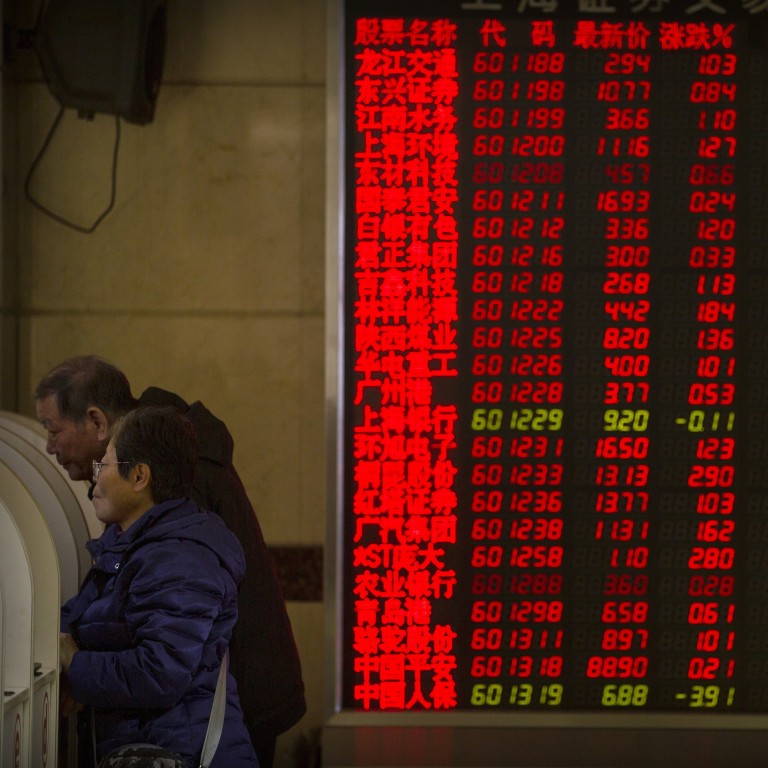
China and Hong Kong stocks fall, as loan prime rate cuts weigh on banks and US-Beijing tensions flare up over protests
- Cuts in one-year and five-year loan prime rates in mainland stoke concerns about banks’ profitability
- Hang Seng Index snaps three consecutive session winning streak, but close of Alibaba IPO retail portion reduces selling pressure
China and Hong Kong stocks fell Wednesday on investors’ concerns about banks’ profitability amid rate cuts in the mainland and a flare-up in Washington-Beijing tensions over legislation moving quickly to US President Donald Trump in support of Hong Kong protesters.
In the mainland, one-year and five-year loan prime rates (LPR) were both cut by a small 5 basis points, to 4.15 per cent from 4.2 per cent, and 4.8 per cent from 4.85 per cent, respectively. It was the third cut this year for the 1-year rate, but the first for the 5-year rate, which is often used in mortgage lending in China. That weighed down banks.
The Shanghai Composite Index snapped a two-day winning streak, closing down 0.8 per cent at 2,911.05. The loss in the CSI, which tracks blue chips listed on Shanghai and Shenzhen, was bigger, with it declining 1 per cent to 3,907.86.
The Hang Seng Index departed from three straight sessions of gains, dropping 0.8 per cent to 26,889.61.
“If you look at the leading Chinese developers, most of which are listed in Hong Kong, the rate cuts have lifted their share price. This, combined with the losses seen in A-share listed banks Wednesday, indicate that the market generally is anticipating further lowering of the new benchmark lending rate,” said Alex Wong, a director at Ample Finance Group.
Tensions between Beijing and Washington rose again, as well.
An overnight threat by Trump to raise tariffs against China “even higher” if there is no US-China trade deal to his liking led Hong Kong traders to profit take, said Alan Li, portfolio manager at Atta Capital.
Meanwhile, Beijing warned Trump about backing legislation passed by the US Senate supporting the pro-democracy demonstrators.
The tensions could threaten the partial trade deal that has seemed to be coming together.
The day’s developments came after Beijing suggested the city’s courts can’t rule on constitutional issues, which some scholars warn could lead to the end of the “one country, two systems” arrangement between the mainland and the former British colony.
“Stocks fell in Hong Kong today on worries about escalating violence in the city and whether the US and China can reach even a partial trade deal,” said Kenny Wen, wealth management strategist at Everbright Sun Hung Kai.
In the mainland, the driver of the day was the loan prime rate move.
Launched in August, the LPR is the average of the 18 reporting banks’ lending rate to their highest quality borrowers. It is linked to the cost of medium-term lending facility and used to price loans to both individuals and businesses.
China Construction Bank fell 1.1 per cent to 7.11 yuan, China Merchants Bank declined 2.5 per cent to 36.58 yuan, Industrial Bank lost 3.4 per cent to 19.16 yuan, Industrial and Commercial Bank of China lost 0.9 per cent to 5.8 yuan, and the Agricultural Bank of China dropped 0.6 per cent to 3.58 yuan.
In Shenzhen, Ping An Bank also fell 3.4 per cent to 15.85 yuan.
Selective mainland financials also dropped: Ping An Insurance slid 0.5 per cent to HK$91.85, and China Construction Bank slipped 0.3 per cent to HK$6.4.
But capping the losses in the Shenzhen Component Index, which dropped 0.8 per cent at 9,809.05, were selective communication technology stocks.
NavInfo, which develops navigation software, surged to the 10 per cent upside limit to 16.38 yuan, after it announced it will work with Huawei on its autonomous driving testing. Wonders Information, a smart city service provider through using internet, clouding computing and big data, also surged 10 per cent to 17.97 yuan.
In Hong Kong, Chinese developers benefited from the cut in the five-year loan prime rate.
China Resources Land rose 0.73 per cent to HK$34.5, while China Overseas Land & Investment rose 0.4 per cent to HK$26.6.
But leading the index lower was insurer AIA, which declined 2.1 per cent to HK$77.8.
“The Hang Seng Index is taking a breather as the 1.6 per cent gain on Tuesday was overdone. But the sentiment in Hong Kong has actually slightly improved, as news about US president Donald Trump threatening higher tariffs on Chinese goods if no deal is concluded did not cause a big move in the index today,” said Wong of Ample Finance.
The retail offering of Alibaba’s mega US$13 billion IPO finished at noon Wednesday, reducing some downward pressure for the Hang Seng Index caused by investors who cashed out of blue chips to buy Alibaba shares, said Wong.
For this week, Wong expects that the Hang Seng Index will hover between the 27,090 -26,790 level.
Additional reporting by Deb Price

